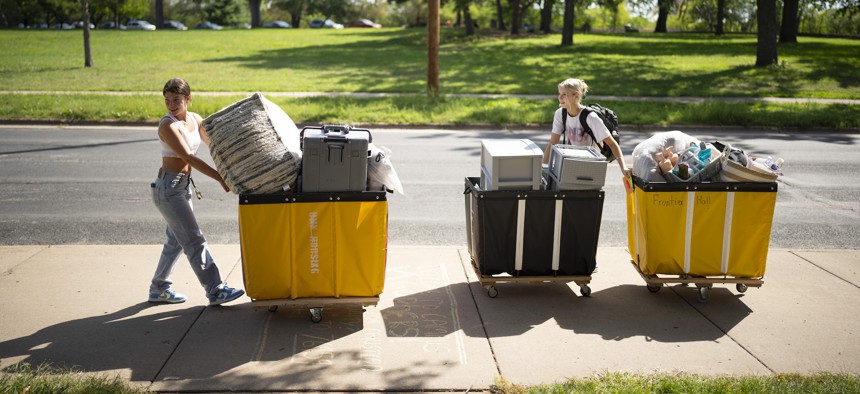State Laws on Reproductive Services, Divisive Concepts Influence Enrollment Decisions

Students move into their dorms on the University of Minnesota Minneapolis campus last year. Jeff Wheeler/Star Tribune via Getty Images
As students consider all the reasons to choose one college or another, state laws are a new factor for some to weigh.
As April draws to a close and college decision day approaches, new research shows that for most people, state laws around reproductive health and other divisive concepts factor into those decisions.
A recent poll from Gallup and the Lumina Foundation found that most people, regardless of party affiliation, would prefer to enroll—or remain enrolled—in postsecondary institutions in states with less restrictive laws on reproductive health and diversity learning, which can include instruction related to race and gender.
Nearly three-quarters of students said that the reproductive health laws in the state where they attend college is at least somewhat important in their decision to stay enrolled, and about 80% of those respondents noted they’d prefer to study in a state with greater access to abortion services. Women and students under 24 are especially likely to fall into this category—notable, as they constitute a larger share on campuses compared to men and students older than 24.
Even among people who aren’t currently enrolled in a higher education program, more than half said reproductive health legislation would be an important factor in determining where to enroll, and 85% of those respondents said they would prefer to enroll in states with less restrictive laws.
Similarly, 74% of college students said laws around divisive concepts influence their enrollment, and just over three-quarters said they’d prefer studying in less restrictive states. Among those who are not currently enrolled in college, 64% said such legislation would influence their decision if they were to enroll.
To some extent, party affiliation appears to influence whether state laws could affect enrollment decisions. Democratic respondents were more likely than Republicans to say they would prefer less restrictive laws. However, some GOP respondents do give some consideration to enrolling in states with tighter regulations, according to Zach Hrynowski, one of the reports’ co-authors.
“Most Republican adults—both those who are currently enrolled, and those who are unenrolled—for the most part, either feel this is not an important topic to their consideration, or they would prefer to go to a university or a program in a state that doesn't prohibit discussions of these topics.”
About three-quarters of Republicans polled favor less restrictive laws on reproductive health and 66% prefer to study in states that allow teaching divisive concepts.
The reports come as states are increasingly taking a stand on abortion rights, with some states enacting abortion bans while others fight to protect reproductive health services and stockpile abortion pills.
Other controversial measures are also influencing students’ decisions about which states to live in for college, the poll found. For example, states like Florida and Georgia are restricting curricula to exclude certain concepts, such as the history of slavery and gender identity, while others are looking to expand education about racism and the historical contributions of minorities. Last year, more than 20 states were considering laws that would restrict discussion, teaching and training around divisive topics, the Gallup-Lumina Foundation report noted.
The poll results are especially notable as postsecondary enrollment has been declining in recent years. Between 2017 and 2022, enrollment dropped nearly 9%, according to the National Student Clearinghouse. While the decline slowed last year, enrollment still sits at more than 1.2 million students short of pre-pandemic levels.
Whether it’s finding a college that offers a particular major or a decent financial aid package, there are already a variety of factors that influence students’ decisions, and restrictive state laws are an additional challenge to those, Hrynowski said.
“This is something that, if I'm an administrator at a college, it's one more thing that I'm thinking about in terms of, ‘How am I going to recruit students to my university and get our enrollment goals?”
Molly Bolan is the assistant editor for Route Fifty.
NEXT STORY: How One State Is Confronting PTSD Among Police Officers






